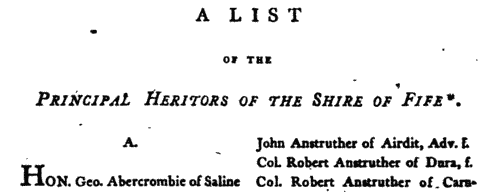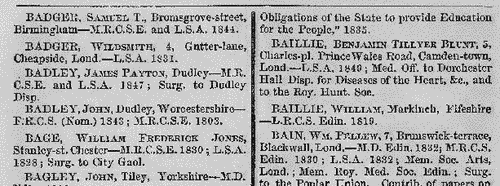Macritchie Surname Ancestry ResultsOur indexes 1000-1999 include entries for the spelling 'macritchie'. In the period you have requested, we have the following 15 records (displaying 1 to 10): Buy all | | | Get all 15 records to view, to save and print for £68.00 |
These sample scans are from the original record. You will get scans of the full pages or articles where the surname you searched for has been found. Your web browser may prevent the sample windows from opening; in this case please change your browser settings to allow pop-up windows from this site. Scottish litigants, rebels and cautioners
(1578-1585)
The Privy Council of Scotland exercised a superior judicial authority in the kingdom, and consequently received and dealt with a constant stream of petitions, as well as dealing with the internal security of the state. This register of the council from 17 June 1578 to 31 July 1585, in the reign of king James VI, was edited by David Masson, and published under the direction of the Lord Clerk Register of Scotland in 1880. Some of the individuals mentioned are the complainants, those of whom they complained, and the sureties on both sides: at this period, some of the complainants are alleging serious attacks, often of a feuding nature. Many of the bonds entered into by the cautioners are promises to keep the peace towards such enemies. Failure to answer to the council when summoned was a serious contempt, leading to being denounced a rebel, with serious consequences. But 'horning' was also used in the pursuit of debts: there was no imprisonment for debt in Scotland, but a creditor could have an obstinate debtor ordered, in the sovereign's name, to pay what was due, failing which, the debtor could be put to the horn, denounced as a rebel, and imprisoned as a rebel. The main text (to page 762) is from the Acta Secreti Concilii, containing the minutes of the Privy Council, and of occasional Conventions of the Estates. After that are printed some miscellaneous Privy Council documents from the same years. The sources most productive of names, the Acta Cautionis and Registration of Bands, are also the most repetitive in form, and are not transcribed verbatim and literatim: nevertheless, one of the editor's rules was for 'All proper names and names of places occurring in the originals to be preserved in the abstracts without exception, and in the exact original spelling.'
MACRITCHIE. Cost: £4.00.  | Sample scan, click to enlarge

| Scottish litigants, rebels and cautioners
(1585-1592)
The Privy Council of Scotland exercised a superior judicial authority in the kingdom, and consequently received and dealt with a constant stream of petitions, as well as dealing with the internal security of the state. This register of the council from 1 August 1585 to 31 July 1592, in the reign of king James VI, was edited by David Masson, and published under the direction of the Lord Clerk Register of Scotland in 1881. Some of the individuals mentioned are the complainants, those of whom they complained, and the sureties on both sides: at this period, some of the complainants are alleging serious attacks, often of a feuding nature. Many of the bonds entered into by the cautioners are promises to keep the peace towards such enemies. Failure to answer to the council when summoned was a serious contempt, leading to being denounced a rebel, with serious consequences. But 'horning' was also used in the pursuit of debts: there was no imprisonment for debt in Scotland, but a creditor could have an obstinate debtor ordered, in the sovereign's name, to pay what was due, failing which, the debtor could be put to the horn, denounced as a rebel, and imprisoned as a rebel. The main text (to page 774) is from the Acta Secreti Concilii, containing the minutes of the Privy Council, with intermixed Acta Proper (political edicts), Decreta (judicial decisions), Acta Cautionis (acts of caution) and Bands (registration of bonds). After that are printed some miscellaneous Privy Council documents from the same years: additional acts of caution (775-778); ordinances and acts anent the Borders and the North (779-814); and miscellaneous privy council papers (815-834). The sources most productive of names, the Acta Cautionis and Registration of Bands, are also the most repetitive in form, and are not transcribed verbatim and literatim: nevertheless, one of the editor's rules was for 'All proper names and names of places occurring in the originals to be preserved in the abstracts without exception, and in the exact original spelling.'
MACRITCHIE. Cost: £4.00.  | Sample scan, click to enlarge

| Scottish litigants, rebels and cautioners
(1592-1599)
The Privy Council of Scotland exercised a superior judicial authority in the kingdom, and consequently received and dealt with a constant stream of petitions, as well as dealing with the internal security of the state. This register of the council from August 1592 to May 1599, in the reign of king James VI, was edited by David Masson and published under the direction of the Deputy Clerk Register of Scotland in 1882. The publication brings together the contents of the principal register (Acta Secreti Concilii) with acts and bands (bonds) of caution (surety) from the registers called Acta Cautionis (pp 561-730); Acts and Ordinances relating to the Borders and the North (731-748); and Miscellaneous Privy Council Papers (749-769). Many of the individuals mentioned are the complainants, those of whom they complained, and the sureties on both sides: at this period, many of the complainants are alleging serious attacks, often of a feuding nature. Many of the bonds entered into by the cautioners are promises to keep the peace towards such enemies. Failure to answer to the council when summoned was a serious contempt, leading to being denounced a rebel, with serious consequences.
MACRITCHIE. Cost: £4.00.  | Sample scan, click to enlarge

| Heritors of Fife
(1803)
A list of the principal heritors of the shire of Fife, compiled from the roll of the court of freeholders, and from private information, by sir Robert Sibbald; also including (marked f.) the names of those whose valued rent was known to entitle them to vote for the representative of the county in parliament, although from the present possessors being minors or females, they were not on the roll of freeholders.MACRITCHIE. Cost: £4.00.  | Sample scan, click to enlarge

| British in India and Ceylon, China and Australasia
(1836)
Births, marriages and deaths, civil, ecclesiastical and military promotions, furloughs, reports of shipping to and from England and the East, with passenger lists, and news items published in the Asiatic Journal
MACRITCHIE. Cost: £6.00.  | Sample scan, click to enlarge

|  Inhabitants of Southwark in Surrey
(1851) Inhabitants of Southwark in Surrey
(1851)
The 1851 census return for St George the Martyr, Southwark, registration district: London Road sub-district: enumeration district 3: described as: "Market St commencing at 'Dog & Stile) (both sides) to Coss (Zinc Worker, opposite Clark's Timber Yard - Providence Place - George St & Passage - Saint George's Row - Parliament Street - St George's Market including Butcher Row - London Road No 92 (Catholic Nunnery) to the 'Duke of Clarence' both inclusive - & Borough Road to Apps inclusive, corner of Mansfield St." This area lay in the parish of St George the Martyr, Southwark. The addresses listed in the actual returns are 17 to 42 and 46 to 50 Market Street, 45, 172 and a half and 173 Southwark Bridge Road, 1 and 2 Market Street, 1 to 4 Providence Place, 8 to 23 Butcher Row, 1 to 12 George Street, 1 Falconer's Court, 1 to 5 George(s) Passage, 3 to 17 (St) Georges Row, 2 to 4, 6, 7, 13 and 16 Parliament Street, 1 to 7 and 26 St George's Market, 92 to 132 London Road (including the Catholic convent), and 1 to 8 Borough Road.MACRITCHIE. Cost: £4.00.  | Sample scan, click to enlarge

| Medical Men
(1853)
The British Medical Directory for England, Scotland, and Wales of 1853 lists doctors, physicians, surgeons and other medical men. Each entry gives full name, surname first; address; qualifications; public appointments; and (where appropriate) a list of books and of works published in medical journals.MACRITCHIE. Cost: £4.00.  | Sample scan, click to enlarge

| Scottish Debtors, Insolvents and Bankrupts
(1886)
Protests on Bills of Exchange, Sequestrations and Cessio Bonorums in Scotland, October to December 1886MACRITCHIE. Cost: £6.00.  | Sample scan, click to enlarge

| Scottish Debtors, Insolvents and Bankrupts
(1887)
Protests on Bills of Exchange, Sequestrations and Cessio Bonorums in Scotland, January to March 1887MACRITCHIE. Cost: £6.00.  | Sample scan, click to enlarge

| Missing Next-of-Kin and Heirs-at-Law
(1900)
The Unclaimed Money Registry and Next-of-Kin Advertisement Office of F. H. Dougal & Co., on the Strand in London, published a comprehensive 'Index to Advertisements for Next of Kin, Heirs at Law, Legatees, &c., &c., who have been Advertised for to Claim Money and Property in Great Britain and all Parts of the World; also Annuitants, Shareholders, Intestates, Testators, Missing Friends, Creditors or their Representatives, Claimants, Unclaimed and Reclaimed Dividends and Stock, Citations, Administrations, Rewards for Certificates, Wills, Advertisements, &c., Claims, Unclaimed Balances, Packages, Addresses, Parish Clerks' Notices, Foreign Intestates, &c., &c.' The original list was compiled about 1880, but from materials dating back even into the 18th century: most of the references belong to 1850 to 1880. For each entry only a name is given, sometimes with a placename added in brackets: there may be a reference number, but there is no key by which the original advertisement may be traced. The enquirer of the time had to remit £1 for a 'Full and Authentic Copy of the Original Advertisement, together with name and date of newspaper in which the same appeared'. This appendix to the list was issued in about 1900.MACRITCHIE. Cost: £4.00.  | Sample scan, click to enlarge

|
| 1 | 2 |  |
Research your ancestry, family history, genealogy and one-name study by direct access to original records and archives indexed by surname.
|













